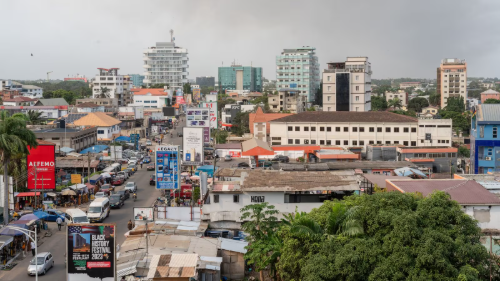Ghana Cuts Rates by Most on Record as Inflation Subsides

TLDR
- Ghana’s central bank slashed its benchmark interest rate by 300 basis points to 25%, marking the largest rate cut in the Bank of Ghana’s history
- The Monetary Policy Committee decision reflects growing confidence in the country’s rapid disinflation trend
- Inflation fell sharply to 13.7% in June, down from 18.4% in May and the lowest level since December 2021
Ghana’s central bank slashed its benchmark interest rate by 300 basis points to 25%, marking the largest rate cut in the Bank of Ghana’s history. The decision, announced following a meeting of the Monetary Policy Committee (MPC), reflects growing confidence in the country’s rapid disinflation trend.
Inflation fell sharply to 13.7% in June, down from 18.4% in May and the lowest level since December 2021. The rate cut is the first since September 2024, when the central bank reduced rates by 200 basis points. Subsequent months saw the rate held or increased due to lingering inflationary pressures.
Bank of Ghana Governor Johnson Asiama said macroeconomic conditions had improved and inflation expectations were now broadly anchored. The central bank anticipates continued easing, supported by a stable policy framework and fiscal consolidation.
The cut exceeded analyst expectations, with a Reuters poll forecasting a 200bps reduction. Economists now expect further rate cuts in the coming months, potentially bringing the benchmark rate to 18% by year-end.
Daba is Africa's leading investment platform for private and public markets. Download here
Key Takeaways
Ghana’s unprecedented 300bps interest rate cut marks a clear pivot toward monetary easing after two years of policy tightening. The move signals the central bank’s growing confidence in the country’s economic recovery and commitment to supporting growth as inflation trends downward. The West African nation is emerging from one of its most severe crises in decades, driven by currency depreciation, fiscal pressures, and rising living costs. With inflation dropping by nearly five percentage points in a single month and expectations anchored, policymakers are now focused on reducing borrowing costs to stimulate domestic demand. Analysts expect more cuts ahead, especially as inflation risks are viewed as manageable. If the disinflation path holds, Ghana could see a cumulative 1,000bps of easing by early 2026. For investors and businesses, the rate cut offers relief and signals a potential turning point in the macroeconomic environment—albeit one that still requires careful policy coordination to sustain momentum.

Next Frontier
Stay up to date on major news and events in African markets. Delivered weekly.
Pulse54
UDeep-dives into what’s old and new in Africa’s investment landscape. Delivered twice monthly.
Events
Sign up to stay informed about our regular webinars, product launches, and exhibitions.




